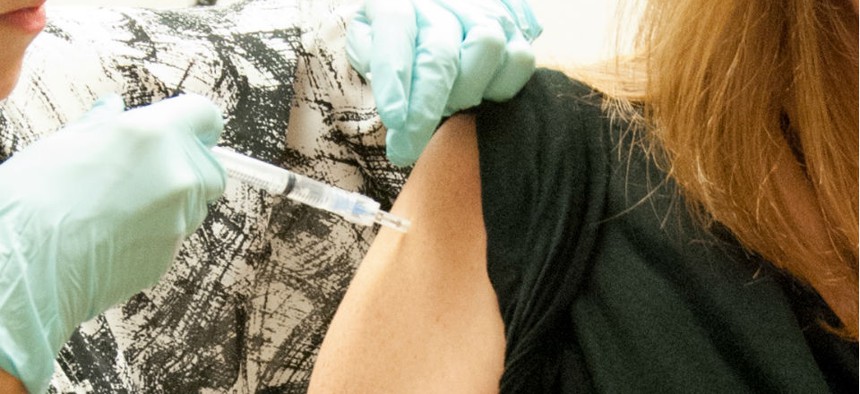
A volunteer receives a dose of an experimental Ebola vaccine at the NIH Clinical Center in Bethesda, Md., in early September. NIAID
One Agency's Short-Lived Idea to Have Its Employees Test a New Ebola Vaccine
News editors at VOA found volunteers, but BBG general counsel balked.
Editors at the Voice of America, whose correspondents have braved visits to hot zones in Africa to cover the Ebola crisis, may have taken one story inspiration too far.
During the public comment period at Thursday’s meeting of VOA’s parent, the Broadcasting Board of Governors, a longtime critic blasted the “ongoing gross mismanagement at VOA” for a short-lived proposal to recruit correspondents and writers to take an experimental Ebola vaccine and then write about it. Ann Noonan, executive director of the nongovernmental Committee for U.S. International Broadcasting, said the episode “sums up the need for change” at the agency.
VOA’s acting public relations director Kevin Lynch on Thursday confirmed the basic facts to Government Executive. “The vaccine idea had a brief life,” he said. “Inviting volunteers for the vaccine was floated and dropped after consideration and discussion within VOA. We are proud of the extensive coverage VOA has provided on Ebola and grateful for all of our reporters who have willingly jumped in to report the story.”
The proposal, which came in an Oct. 16 email to staff from VOA Deputy Managing Editor David Jones, was leaked to the Washington journalism website Fishbowl DC, published by Media Bistro.
“I’m just wondering if any of our correspondents or writers would be interested in becoming a volunteer for the Ebola vaccine being tested at Walter Reed [hospital in Silver Spring, Md.], and then report or blog about the experience?” Jones wrote. “Officials say there is no possibility of contracting Ebola from the vaccine because it does not contain the virus. They mainly seem to be interested in making sure there are no other side effects. (There is already one potential volunteer but I want to make sure everyone has a chance).”
The idea was instantly attacked by bloggers on the anonymous BBG criticism site BBGWatch.com. Among them was the “Federalist,” who wrote that the idea belongs “in the category of ‘Let’s do something really stupid.’ ” According to staffers and reporting by Media Bistro, the proposal won approval from VOA Director David Ensor and Executive Director Steve Redisch. A total of three staffers (one a senior manager) had volunteered before the idea was frowned upon by the BBG General Counsel’s office.
The potential vaccine, according to an Oct. 15 USA Today report, was developed by the Public Health Agency of Canada and testing on it began Oct. 13.
The blogger-critics of BBG quoted health authorities noting that most experimental vaccines are not expected until next year, and called for firings of top managers. “This was a cheap and tawdry publicity stunt,” the Federalist wrote, “trying to make the agency the story, rather than putting itself to the grindstone and reporting on the story as it exists.”
Editors of BBGWatch said, “The VOA management made this call apparently without worrying too much about employee morale, perceptions of public safety in the federal workplace, and journalistic propriety of making such a call for a story.” They pointed to a decline in employee morale and respect for leaders at the BBG’s entities in the recently released Federal Employee Viewpoint Survey. Satisfaction dropped four points between 2013 and 2014 at BBG, according to the survey. (Other agencies, however, showed sharper morale declines.)
Meanwhile, the Voice of America team remains active in worldwide coverage of the Ebola outbreak. “Every day, Voice of America broadcasts news about the Ebola outbreak to millions of people in Africa in more than 20 languages, along with information about how to avoid contracting the disease,” the BBG said on its website. “A reporter for VOA based in Sierra Leone, Adam Bailes, recently became one of the first journalists to travel to the village of Makeni, in Sierra Leone’s Northern Province. He filed a heartbreaking video report. There are no treatment facilities for Ebola in Makeni, as his report makes clear. As a result patients wait in a holding facility to be transported to the only place in the country able to take them, a Doctors Without Borders treatment center that is 16 hours away by ambulance. Bailes got to Makeni by making that 16-hour journey.”
Correspondent Carol Guensburg, BBG noted, recently told WUSA-TV in Arlington, Va., of her meetings with Ebola survivors during a week in Guinea under the auspices of UNICEF. Describing the self-monitoring health precautions she had taken to avoid or detect infection, she also interviewed Guinea’s prime minister who has been meeting with villagers on changing their health habits. Those changes aren't simple, the correspondent said. “Doing so means changing customs, especially burial customs."
NEXT STORY: CDC to Award More Money to Fight Ebola







